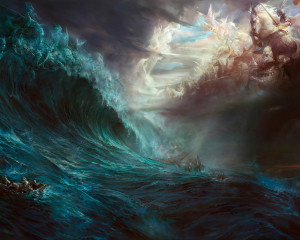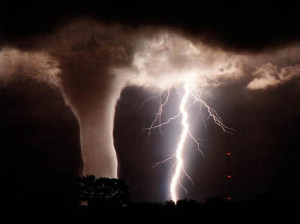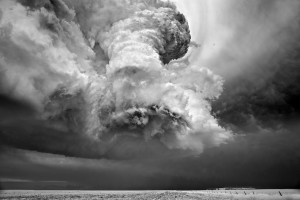 As we seek to learn why bad things happen in this world, we are looking at several principles of a theological chaos theory. We are currently discussing the point that due to the fall of humanity, nature has spun out of control. In yesterday’s post we saw that Scripture and theology seems to indicate that in some way humans were enabled by God to guide and control natural forces, but when we sinned, we lost this ability, and nature spun out of control.
As we seek to learn why bad things happen in this world, we are looking at several principles of a theological chaos theory. We are currently discussing the point that due to the fall of humanity, nature has spun out of control. In yesterday’s post we saw that Scripture and theology seems to indicate that in some way humans were enabled by God to guide and control natural forces, but when we sinned, we lost this ability, and nature spun out of control.
Due to sin, we lost control of the powers that control nature, and having spun out of control, they now wreak havoc on the world. There is now disarray and chaos in creation.
From this, we can know several things.
Storms are Not Sent “From God”
First, when storms and disasters occur, they do not “come from God.” Storms are not sent by God. (I know that some will object and point to the Flood or to the storm that God sent to bring back a fleeing Jonah. We will look at these texts at a later time.)
Storms occur because the forces of nature are out of control. Much of the work of God on earth is focused on protecting humanity from complete destruction at the hand of these destroying powers. Sometimes God “withdraws” His hand of protection and allows storms to rage, but we must be careful with saying that this is why all storms occur. We do not know why God allows some storms. When it comes to storms, there is much we do not know.
For example, we will never know all of the boundaries that God has placed upon the destructive powers so that they do not overwhelm and annihilate mankind forever. We can never know how many disasters have been averted, how many floods have been avoided, how many meteorites have been nudged off course by God. And when storms and disasters do occur, we can never know what string of events and decisions by God, angels, and human beings led to that storm occurring.
In other words, when destruction comes, it is always a result of a nearly infinite number of factors which we may never know. Often, when evil things occur, we think we know “What” happened and seek to ask God “Why?” But with this explanation of nature having spun out of control, we see that it often answers the “Why?” question, and the question we really do not know is the “What?”
Storms are Caused by a Nearly Infinite Number of Variables
Along with all of the nearly infinite number of variables related to the free choices of free agents (which we saw in the first point of chaos theory, which include not only the free choices of humans, but also of angels and animals), there are also the nearly infinite number of variables related to the forces of nature which have spun out of control.
 In any one event, we can never know the series of choices and natural occurrences that led up to that particular event. Scientists have often talked about “the butterfly effect” wherein it is entirely possible that a single flap of a butterfly a thousand years ago on the other side of the world sparked off a chain of events that ultimately and eventually led to an F5 tornado ripping through Moore, Oklahoma.
In any one event, we can never know the series of choices and natural occurrences that led up to that particular event. Scientists have often talked about “the butterfly effect” wherein it is entirely possible that a single flap of a butterfly a thousand years ago on the other side of the world sparked off a chain of events that ultimately and eventually led to an F5 tornado ripping through Moore, Oklahoma.
When we add to this the free choices of humans, angels, and animals, it becomes utterly and completely impossible for humans to know with any degree of certainty “What” happened in any given situation. To explain any particular event, we would have to know the exhaustive history of every person, every angel, every animal, and event, and indeed, every thing, in the entire universe. God knows all this, of course, but He also knows it is hopeless for us to understand even the smallest sliver of this infinitely complex creation which has spun into chaos. It is impossible for Him to attempt to explain it to us—which is why He never tries.
When bad things happen, we cannot ever know “What” happened. But we can partially know “Why.”
 Bad things happen in this world because creation has spun out of control. Due to sin and the rebellion of mankind, the forces of creation are in chaos. In such a situation, terrible things happen.
Bad things happen in this world because creation has spun out of control. Due to sin and the rebellion of mankind, the forces of creation are in chaos. In such a situation, terrible things happen.
It is not that God planned them, ordained them, or caused them. His good creation was not intended to function this way, but since He gave humans, angels, and even animals (to a degree) the freedom to make genuine choices, we sometimes use this freedom in ways that are contrary to the will and desire of God, and when we do this, the forces of nature suffer the consequences, and chaos rages over the face of earth, wreaking havoc, destroying lives, and bringing destruction in its wake.
Even though this is not truly an explanation, this second principle of the chaos theory helps explain a lot of the natural violence that goes on in the world.
Storms are not from God; they are a result of nature having spun out of control. God’s involvement is not to send storms, but to protect us from them. When storms come, there are a nearly-infinite number of variables that causes them.
 How can a God who says "Love your enemies" (Matthew 5:44) be the same God who instructs His people in the Old Testament to kill their enemies?
How can a God who says "Love your enemies" (Matthew 5:44) be the same God who instructs His people in the Old Testament to kill their enemies?
These are the sorts of questions we discuss and (try to) answer in my online discipleship group. Members of the group can also take ALL of my online courses (Valued at over $1000) at no charge. Learn more here: Join the RedeemingGod.com Discipleship Group I can't wait to hear what you have to say, and how we can help you better understand God and learn to live like Him in this world!




A task at which He is a bit streaky, to say the least. Or has He been been napping lately?
That sounds like a good thought, but it simply is not Biblical. The Bible is very clear that it is God who directs and controls the storms. Sometimes he grants control to men (for example, Elijah who by prayer caused it to stop raining and then to rain) or Satan (the storm that killed Job’s children), but it is always under His watchful, sovereign care — they never go beyond what He allows.
You really need to read Job 36:26-37:24 where Elihu talks directly about the thunderstorms and tempests and God’s loving control of them. Verse 13 of chapter 37 makes a profound statement: “Whether it is for punishment for his land or whether it is for mercy, he causes it to find its mark.” Every drop of rain falls precisely where God intends it.
Storms are most decidedly from God and they are both mercy and punishment according to His will.
In order to learn why storms exist, we must first study the scriptures pertaining to a sovereign God.
This will let us know if things happen at random, or if someone is in control.
Scripture Examples:
Lamentations 3:38 Is it not from the mouth of the Most High that good and bad come?
Job 36:26-33
“Behold, God is exalted, and we do not know Him; The number of His years is unsearchable. “For He draws up the drops of water, They distill rain from the mist, Which the clouds pour down, They drip upon man abundantly. “Can anyone understand the spreading of the clouds, The thundering of His pavilion? “Behold, He spreads His lightning about Him, And He covers the depths of the sea. “For by these He judges peoples; He gives food in abundance. “He covers His hands with the lightning, And commands it to strike the mark.
Luke 8:24-25
They came to Jesus and woke Him up, saying, “Master, Master, we are perishing!” And He got up and rebuked the wind and the surging waves, and they stopped, and it became calm. And He said to them, “Where is your faith?” They were fearful and amazed, saying to one another, “Who then is this, that He commands even the winds and the water, and they obey Him?”
Job 12:13-16 To God belong wisdom and power; counsel and understanding are his.14What he tears down cannot be rebuilt; those he imprisons cannot be released he holds back the waters, there is drought; if he lets them loose, they devastate the land.
But if you are to look at Jesus, then you must include the picture of Him when He returns in glory:
From his mouth extends a sharp sword, so that with it he can strike the nations. He will rule them with an iron rod, and he stomps the winepress of the furious wrath of God, the All-Powerful. He has a name written on his clothing and on his thigh: “King of kings and Lord of lords.”
(Revelation 19:15-16)
There is a reason why the scripture speaks of the fear of the Lord — because there is much to fear in Him when His wrath is against you. It is only when you understand His holiness and the righteousness of His wrath that you realize the true depth, beauty, and awesome wonder of His boundless grace. Rather than trying to cover up the Old Testament, allow the Bible to reveal the solidarity of its view of God. His grace shines forth even in the Old Testament with the forgiveness of sinful men, and the restraining hand of judgement given multiple opportunities to turn and repent before the judgement comes.
Be wary of the temptation to pick and choose the aspects of God that we like. Rather, we need to be ready to receive who He actually is as He has revealed Himself in the scriptures.
Matt,
There is a large difference between what the Bible says and what we think the Bible says. So when you say my view is not Biblical, what you mean is that my view does not fit your understanding of the Bible. That is fine, because what you express does not fit my understanding of the Bible.
I have a way of reading Scripture that allows everything to look like Jesus. Everything. And nowhere in the Gospels do I see Jesus sending storms. He calms storms. So if Jesus fully reveals God to us (as He claims), then something else is going on in the Old Testament texts which depict God as a Zeus-like deity who hurls storms on people because He’s mad at them. Though I admit that this is the way the Old Testament text reads on the surface, I think that when we read these texts in light of Jesus (and especially Jesus on the cross) and whole new picture emerges of what God is really like.
God is not like Zeus; He’s like Jesus.
“I have a way of reading Scripture that allows everything to look like Jesus. Everything.”
Which Jesus are you talking about. If the Bible states that The Father, Son and Holy Ghost are one, the why would you think to have a special gift that seems to negate the very scriptures and aspects of a Sovereign and Holy God who does send judgment and wrath. (If you be His children, He chastens those that belong to Him.) No one has some special gift that would stand to make them exclusively above others in the body of Christ. what you are stating not only is unscriptural, but sounds like you are down right deceived and guru-like. Special gift to “make everything sound like Jesus”?
Even the bible states that Satan comes as an angel of light. If false religions are started by some “revelation” from an angel (ie Mormonism, Word of Faith, New Age etc) then why would what you are stating be any less of a deception? In taking the bible, you take in the WHOLE bible. You cannot choose what sounds nice and fluffy and forget the other. There is balance. Also, Jesus suffered on the cross. If we are His disciples we will go through suffering. Its in those storms that we should bear much fruit. Those are the things that really are important. How to manage in the storms, not negate the existence of them by saying they are not of God. (book of Job comes to mind here) Even in the bible God had sent an evil spirit against a man. He also struck those who were eating steak after they had complained about the manna and demanded meat (and after He struck them mid-meal, they puked it out their noses). Anyway., maybe my view is different and I am not condemning, but I am pointing out that when you state you have some special gift that makes you “special” and separate from the body of Christ and you pass correction off as that you do not hold the same accountability to correct view of the bible, then you are already in danger. It is one thing to believe in Jesus, but it better be the same Jesus in the bible, and not some idea of what you think Jesus is. He is Holy and He and the Father are ONE. (my two cents)
be safe. God Bless
TSG,
Wow. You read an awful lot of theology into my statement. I was making no claim to special knowledge or special revelation. All I meant was that a way of reading the whole Bible which I have learned from others apparently differs from the way you and others read the Bible. You do know, don’t you, that not everyone agrees on what the Bible means?
Do you believe that your theology is wrong anywhere? That you believe anything which is incorrect? That the way you read some Bible texts might not be accurate? If not, then it is you, not me, who seems to be making a claim to a special gift of understanding the Scriptures.
For me Jesus put paid to the notion that God punishes us whilst we are still on this earth (Luke 13:1-5) To say that x event is punishment sent by God is to say their sin was worse when Jesus is clear it isn’t. Also 2 Peter 3:9 seems clear that God wants no one to perish so sending storms as punishment that kills people makes no sense, it makes no sense of the cross and the gospel
That’s not saying judgment isn’t to come, or that everyone will be in the new heaven and new earth when God recreates everything, but whilst we are on this earth God does not send punishment, the consequences of our actions are enough. I put my very amateur views here
http://www.evidence2hope.com/apps/blog/show/25487227-god-and-punishment-do-these-things-go-together-
Jeremy, thanks for tackling a difficult subject. I enjoy your blogs and appreciate your efforts. However, I’m inclined to agree with Matthew Aznoe. From a logical viewpoint your explanation has a pickle: God allows storms but doesn’t send them seems to split hairs on direct or indirect responsibility. If Obama allows drones into Pakistan by granting the Pentagon to send them that makes Obama indirectly responsible. God is love but he is also terrifying. God protects us but has no problem destroying us. That he hasn’t done so sooner is because either his mercy is toward you or the blood of Jesus is over you. For the world without Jesus, there’s something much worse than storms and plagues coming down the pike, namely God’s judgment.
Matt,
Yes, I do consider the book of Revelation. Since it is a highly symbolic book, John is doing something very specific and surprising with the portrayals of a violent Jesus in that book. I can’t get into it here, but will write several posts on in down the road.
And yes, I am wary of picking and choosing what aspects of God I like. But this is a warning for everyone, especially for those who want to use violent portrayals of God in Scripture to defend and justify their own violence toward other people. Might not this be the reason we are so reluctant to let Jesus be our guide in how to understand the character and nature of God?
Graham,
Right on! Often, the punishment for sin is in the consequences of sin. I love it. I am headed over to check out your blog.
Yuri Wijting,
Thanks for the comment. I know my view is a tough sell, but only because we are so used to the traditional view which became commonplace after Emperor Constantine started using violence to advance the cause of Christ. Prior to that, the view I am presenting seems to be the majority view.
Anyway, I am writing a whole series of posts on “chaos theory” which explains where storms come from and how God allows them but doesn’t send them. I am not sure I can answer all the objections, but I hope that my view will have fewer objections than the common view that God and Jesus are violent deities which do harm to people.
Jeremy, I am actually a pacifist (1 Peter 2:23), so no, I believe quite strongly that Jesus is our prime example of how to live rightly before God. However, that does not mean that God the Father or even Jesus Himself are devoid of violence. Only God can exhibit true righteous anger and can mete out violence as a method of true justice and Godly discipline. The fact that deadly storms are the exception and not the rule is an exhibition of God’s grace since we are all worthy of divine judgement. He sends the storms to remind us of His power and to reflect upon our walk with Him.
The Bible makes many direct claims of God’s control over weather (for nourishment, for judgement, and for mercy) and no direct statement to the contrary or to limit His power. You can only arrive at that conclusion by carefully crafted logic than requires writing off some passages and highlighting others. It is good to challenge the status quo when it does not line up with scripture (like confronting the desire for violence and vengeance especially among “conservative” Christians), but we should not in our zeal push the pendulum too far the other way and undermine our view of God’s sovereignty, power, and holiness.
Jeremy, All the best with your project! You may want to consult this article by Peter Enns (Perhaps you already have): http://www.patheos.com/blogs/peterenns/2012/07/john-piper-on-why-its-right-for-god-to-slaughter-women-and-children-anytime-he-pleases-and-why-i-have-some-major-problems-with-that/ It offers a good challenge to the traditional understanding of violence in the OT. I admit that if Peter Enns is right then violence as an essential aspect of God’s character may have to be understood differently.
Matthew Aznoe
I am not sure how you are defining pacifist, but my opinion is that Jesus was not a pacifist, and neither was God. I am not trying to defend a pacifist perspective either.
The logic I use to make God look like Jesus as He is portrayed in the Gospels is how I understand the words of Jesus Himself. For example, John 14:9-11. It seems that in your view, Jesus didn’t actually mean what He told the disciples in the Upper Room, for if there is a dark side to God, it was certainly hidden in Jesus during His ministry, which means that when Jesus tells Philip, “If you have seen me, you have seen the Father” what He really meant was “You haven’t fully seen the Father, only the loving side.”
Based on this text (and many others like it), I don’t think it is carefully crafted logic which reads God in light of Jesus, but a carefully crafted deception which makes God look murderous and violent.
Let me frame it another way. If Allah did and commanded the same things that God supposedly does, would you be as quick to defend the actions of Allah? Of course not! So why do we call good what is so clearly wrong?
Yuri Wijting,
I like Peter Enns and have read several of his books. That is a great article and as he points out, it is shocking what John Piper says.
As I pointed out in a previous comment, if God actions as portrayed in the OT were found in the Muslim Quran as being commanded by Allah, Christians would be quick to condemn them. But when God does them in our own Holy Book, we call things good that would be evil in any other context. It baffles me as to why we do this, especially when it seems to me that Jesus makes a point of telling us that He is what God looks like, and in the Gospels, Jesus never kills, goes to war, or tells anyone to do such things, but instead to love and forgive our enemies.
Clive,
Fantastic, excellent point! Ruining our planet has natural consequences, such as floods and storms. We have no business blaming God for these sorts of catastrophes.
For me, the more I read, the more this series perfectly demonstrates a relationship where we are know-it-all teenagers and God is our wise father (which of course He is). There are quotes out there about the more we learn about the universe, the more we realize we don’t know (I could probably find it on Google but I’m too lazy). Anyway, it’s interesting that this applies to God as well as science, probably more so. It’s especially interesting considering we have a textbook about him. I mean, even from the standpoint that we don’t even know what questions we are trying to answer, the “What?” and the “Why?”. It just gives me pause, and a sense of awe.
Well, thanks. I am really struggling with this series, but mainly because it is blowing the lid off most of my theology, and it scares me. I guess that’s a good thing based on what you are saying. Maybe I just rest back into the knowledge that God looks like Jesus, and realize that I cannot get all my questions answered.